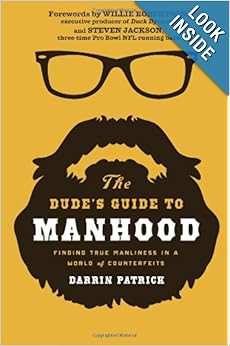
The Dude’s Guide to
Manhood: Finding True Manliness in a World of Counterfeits by Darrin
Patrick
A moustache and a beard on the front cover and I am
hooked. This new book entitled The Dude’s
Guide to Manhood by Pastor Darrin Patrick is a look into what makes a man and
also what pulls him in the opposite direction. I was excited to have this book
in my hands and to read through its pages in a mere few days. The tone of the book is broadly focused to
include men of kinds with a view towards becoming a certain type of man:
content, working, disciplined, coachable, family, emotional, and forgiven. What was refreshing about the work was its
personal connection between Darrin’s struggle to become a man who engages in
responsibility in every area of life and the application of some sound
principles for all men. The Drill
sections in the book were quite beneficial because they provided concrete
practical steps men can take to put the principles of the book into
action.
The relationship between husband and wife goes a long way in
securing for our children the sense that we love them. Darrin points out that, “It’s important to
have friends, but your wife must be your best friend. It’s good to have a career, but your wife
must be more central to you than your career.
And there is nothing wrong with having a hobby, but your wife must be
important to you than your hobby.” (94)
Being a man of character doesn’t mean discarding everything that we
enjoy for recreation but it means putting our love for our wife in proper
relationship to everything else. Darrin
goes onto say that the constant loving communication between husband and wife
brings stability to your children.
How? Well, focusing in on your
spouse through actions of love lets everyone else know that you are fully
committed to one another, no matter the situation or in some cases the number
at the bank account. Having a stable
father in the home is not just a good thing, but it provides leadership in the
home that cannot be replaced.
Darrin points out that it is easy for men to share their
emotions on the ball field or in a recreation, but this is harder in the
context of family relationships. The
important connection in the chapter on emotions is Darrin’s comment that, “When
others around us don’t know what we are feeling, they will be uncertain and
hesitant toward us. Those close to us
want to know us.” (124) For a man to
feel that his wife and children want to know him, emotions and all, is a
freeing thing. Emotions become out of
control when we stuff them in and not let them out or we boil over every time
there is a situation out of our hands.
Rather, the right way to deal with such things as anger is take some
time to let things simmer down and patiently come to a right frame of
mind. I would add here that the use of
emotions as a man is not easy but is worth the effort in opening up our hearts
to those closest to us.
Darrin’s book is a call for men everywhere to take stock of
their life and own up to their insecurities, failures, and setbacks, while
keeping an eye on moving forward. The
focus of the book was more of men at large than it is Christian men, but the
last few chapters focused on how faith in Christ makes sense of the prior
chapters.
Thanks to Book Look Bloggers and Nelson Books for the copy
of this book in exchange for review.
Comments
Post a Comment